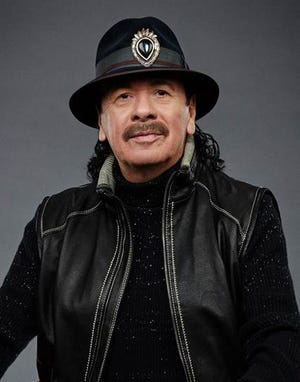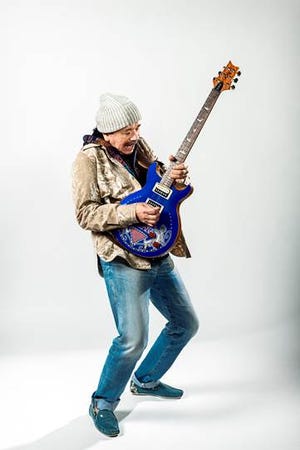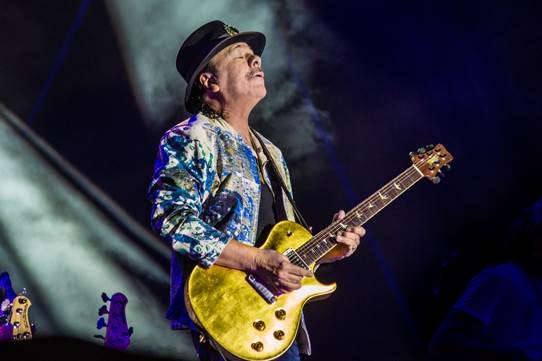No products in the cart.
Healing
Carlos Santana on spirituality in music, 53 years after Woodstock
Legendary rock-fusion guru Carlos Santana graces the Riverbend stage Saturday, July 9. Consistently recognized as one of the best guitarists of all time since his band’s breakout at Woodstock in ‘69, his unmistakable sound and genre-transcending collaborations in recent years have made him a household name around the world.
I recently had the honor of speaking to him about his musical influences, his choice of guitar tone and about the role of spirituality in his performance.
Q: You started on violin and played in your father’s mariachi band. Then your family moved to Tijuana, where you were introduced to guitar and blues music. Even on guitar, your playing style is very melodic and you have a very distinct guitar tone. It’s reminiscent of the violin, and it’s a tone that’s been consistent since the beginning of your career. It’s easy to recognize it’s you in the first few notes of any song you’re playing. How did you decide on that tone?
A: I noticed that in music you have staccato and legato. Staccato is syncopation and legato is like a rainbow. Staccato’s up and down, and legato is from left to right. That’s what I learned from Miles (Davis) about playing counter-motion. That way it’s not only that you stick out, but you stand out. Everybody practices what they feel they need to practice. I practice learning how to get inside the note. When you play inside a note in legato, it’s like a very well-needed hug, or medicine. There’s something about playing music for me that’s not showing up or impressing, but more like healing.
I got my tone from my mom and my dad, but also from listening to the same people that Eric Clapton and all of the British musicians listened to: Otis Rush, Buddy Guy, BB King, Albert King, Freddie King. I listen to the same people that Steven Ray Vaughn listens to. But I listen more to Coltrane and Miles and Aretha, not just blues players. That’s the only difference that I have over a lot of guitar players. I try to simplify as much as possible so that it’s a universal language and you don’t have to have a translator to tell people what you’re saying.
Q: Your concerts, like you said, are all about connecting with and moving the audience – a spiritual experience. And you’ve delved quite deeply into meditation and spiritual work. Do you think that spiritual journey has contributed to your longevity in life, or as a songwriter and performer?
A: Yes, without a doubt. I remember Buddy Guy – he opened up for us and BB King. And he was telling people, “Yeah, I can do Stevie Ray. Watch this. I can play Eric Clapton.” But then later on, he told me, “I don’t do you. I don’t play you.” The only people who, to my knowledge, play closer to me are Prince and Orianthi, and I think that they were fascinated with the same thing that I’m fascinated with: How do you crystallize multidimensional into one note? One note – I can play in Ireland or Africa and I’m not a tourist. I’m part of the family. People trust you when you play that note a certain way.
Q: When you moved to the Mission District in San Francisco, you’ve described it as akin to a college education. The first big venue you consistently played was the Fillmore. The booker there, Bill Graham, was a Polish refugee. You both shared an immigrant mentality which, what I read, was a big change from your first experience of San Francisco. Did the racism you experienced early on influence your playing style or songwriting? Did you feel like you had something to prove?
A: When I came to San Francisco, the biggest movie was “West Side Story.” You have the Sharks and the Jets. With Bill Graham, he called me the son of BB King and Tito Puente. Bill Graham and Clive Davis told me the same thing: “With everybody else, it’s a job. But with you and Whitney, this is my heart.” Once they hear me and they see me, it’s like they stop and want to go out of their way to open the door for me. A lot of people tend to be competitive. But with Eric Clapton and myself, or Michael Bloomfield from the beginning, I’m very grateful to tell you that people always went out of their way to be very helpful to me.
Q: Speaking of Clive Davis, he helped produce your collaborations on “Supernatural.” That album, because of my age, was essential to my understanding and appreciation of your music. How do you pick who you collaborate with?
A: I don’t. There’s a divine intelligence orchestrating, even while I’m sleeping, who is going to be next to show up and bring a song. Whether it’s Rob Thomas or Lauryn Hill or Diane Warren, they all show up before I’m even aware of it. And for you too, there’s a divine intelligence orchestrating for both of us, even while we sleep. It’s encouraging to know that divine intelligence, whatever you want to call it, God or Jesus or whatever, it’s there orchestrating miracles for you.
Q: You’ve played so many different styles of music and it’s very rare that you sound out of place, even with such a distinct and consistent playing style and tone. What allows you to mix so well with any type of music?
A: I relate to what Bruce Lee said: What you identify with is where your focus is going to be. I identify with water. Sooner or later you get thirsty. You’ve got to have some water. I used to say music is the water, I’m a hose, people are the flowers. And that makes it really easy. That way, I don’t have to compete with anybody or compare. I believe that God loves me, and believes in me, and with that, I can go really far.
Santana and Earth Wind & Fire: Miraculous Supernatural Tour
When: 7:00 pm, Saturday, July 9.
Where: Riverbend Music Center, 6295 Kellogg Ave., Anderson Township.
Tickets: $39-$79.



